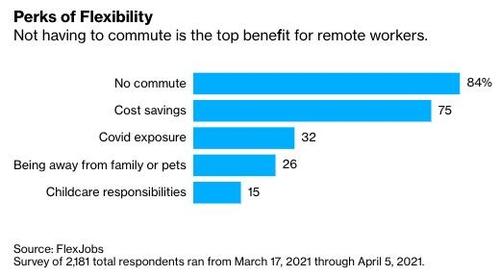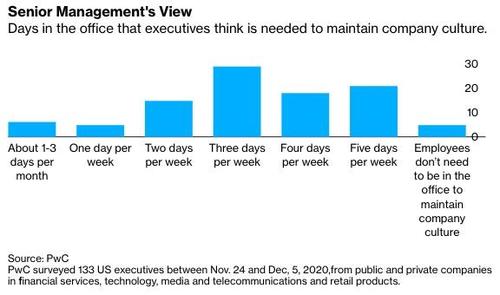More Workers Are Quitting Their Jobs Instead Of Returning To The Office
A few hours ago, St. Louis Fed President James Bullard, a longtime member on the FOMC (though he doesn't have a vote this year), told the FT that the American labor market is tighter than it appears, and that he was "starting to advocate" for the Fed to look at "other measures of job market tightness".
As the market braces for the next monthly jobs number (the first since April's historic miss on expectations), Bloomberg News has just published another post reminding investors that what motivates workers isn't always straightforward, or the same for everyone, and that a surprising number of white collar workers are quitting their jobs instead of returning to the office. The takeaway from the post is that many workers who were hired with the promise that they remain 100% remote are bucking when they're suddenly being pressured to return to the office.
That could be bad news for JP Morgan and other banks who have pledged to keep workers coming into the office, especially as more tech firms embrace the 'work from anywhere' ethic.
A six-minute meeting drove Portia Twidt to quit her job.
She’d taken the position as a research compliance specialist in February, enticed by promises of remote work. Then came the prodding to go into the office. Meeting invites piled up.
The final straw came a few weeks ago: the request for an in-person gathering, scheduled for all of 360 seconds. Twidt got dressed, dropped her two kids at daycare, drove to the office, had the brief chat and decided she was done.
"I had just had it," said Twidt, 33, who lives in Marietta, Georgia.
With the coronavirus pandemic receding for every vaccine that reaches an arm, the push by some employers to get people back into offices is clashing with workers who’ve embraced remote work as the new normal.
Some workers told Bloomberg that they're worried mostly about the type of intensely hands-on management styles preferred by some bosses who, incidentally, are probably among the most vocal proponents of returning to the office.
With the coronavirus pandemic receding for every vaccine that reaches an arm, the push by some employers to get people back into offices is clashing with workers who’ve embraced remote work as the new normal.
Right now, it's too early to tell how many workers are actually going to return to the office. It’s still too early to say how the post-pandemic work environment will look. Only about 28% of US office workers have returned to their buildings, according to an index of 10 metro areas compiled by security company Kastle Systems.
JPM has already recalled most of its white collar workforce back to the office, but other banks and other firms, including tech giants like Google, are looking at allowing their workers to continue on remotely.
For older workers, especially those with kids, the time that they save from not commuting has been critical. The lack of commutes, and associated cost savings are the top benefits of remote work, according to a FlexJobs survey of 2,100 people released in April. More than one-third of the respondents said they save at least $5K per year by working remotely.
Source: Bloomberg
Another worker who spoke with Bloomberg is, like many others, using the time they saved to work on a small business.
Jimme Hendrix, a 30-year-old software developer in the Netherlands, quit his job in December as the web-application company he worked for was gearing up to bring employees back to the office in February.
"During Covid I really started to see how much I enjoyed working from home," Hendrix said.
Now he does freelance work and helps his girlfriend grow her art business. He used to spend two hours each day commuting; now the couple is considering selling their car and instead relying on bikes.
One of the main benefits, he says, is more control over his own time: "I can just do whatever I want around the house, like a quick chore didn’t have to wait until like 8 p.m. anymore, or I can go for a quick walk."
Bosses who take a hard stance on remote work should prepare to lose workers, especially those with more marketable skills. According to a Jan. 12 PwC survey of 133 executives, fewer than 20% said they wanted to go back to pre-pandemic routines. But only 13% were prepared to abandon the office for good.
Source: Bloomberg
One previously anonymous IT worker set off a firestorm on Twitter when he commented that his colleagues "started quitting" when the bosses started talking about a return to the office. Gene Garland, 24, told Bloomberg that two of his colleagues handed in their resignation letters almost immediately.
Bro, they said no more teleworking and my co-workers started QUITTING
— Genie 🍎🦉🗽 (@GenieShinobi) May 3, 2021
Twidt, the young woman who quit after being pushed to attend a brief in-person meeting said she quickly found a new all-remote position. When she asked the recruiter who approached her about being 100% remote, the recruiter replied: "We can do that for you immediately".
https://ift.tt/3uJZjgD
from ZeroHedge News https://ift.tt/3uJZjgD
via IFTTT







0 comments
Post a Comment